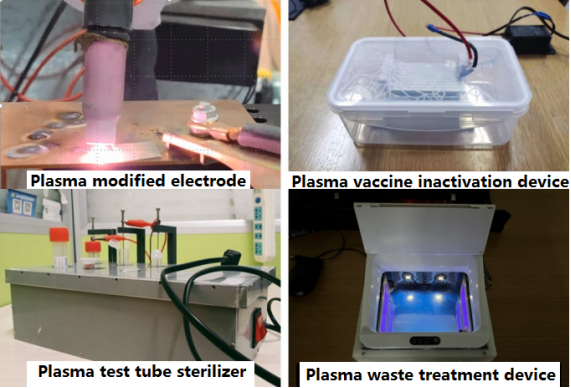On August 23, 2022, the finals of the 2nd College Student Plasma Science and Technology Innovation Contest, hosted by China Electrotechnical Society and jointly organized by Tsinghua University, Beihang University, Beijing Jiaotong University, and Beijing Institute of Technology, came to an end. This competition received more than 300 works from more than 70 colleges and universities across the country, of which 128 works entered the finals, and 6 special prizes, 34 first prizes and 54 second prizes were finally decided. The 4 teams under the guidance of Associate Professor Luo Haiyun, Associate Professor Lin Jin and Assistant Researcher Guo Yuntao of the Department of Electrical Engineering and Applied Electronics (EEA) of Tsinghua University won 1 special prize, 1 first prize and 2 second prizes; Comparing with that EEA won 1 special prize, 1 first prize and 1 third prize each, EEA still performed well in both prize quantity and prize quality this year. Particularly, the “Research on New Process of Ni-Hydrogen Electrode Based on Plasma and Electrodeposition Technology” which won the special prize received the unanimous favor of the expert judges in the preliminary competition and the final competition, reflecting the new trend of plasma and energy interaction.
List of Winners of the 2nd Plasma Science and Technology Innovation Contest for College Students of China Electrotechnical Society |
Unit |
Work name |
Prize level |
Students |
Instructors |
Tsinghua University |
Research on New Process of Ni-Hydrogen Electrode Based on Plasma and Electrodeposition Technology |
Special prize |
Liu Zhicheng, Song Haotian, Wang Zhongyang, Li Peipei, Song Kairun, Jia Hongyu |
Lin Jin Luo Haiyun |
Tsinghua University |
Plasma-based high-efficiency inactivation system for inactivated vaccines |
First prize |
Sun Xiaoyu, Cai Xinyao, Dai Yue, Yang Jianfan, Wu Xiaxuan |
Luo Haiyun Guo Yuntao |
Tsinghua University |
Discharge plasma-based nucleic acid test waste treatment device |
Second prize |
Lu Ruijian, Zhang Haoyu, Bi Xudong, Liu Yimeng |
Luo Haiyun Guo Yuntao |
Tsinghua University |
Discharge plasma test tube sterilizer |
Second prize |
Liu Yangbo, Xu Xin, Kong Xiangbo, Li Songzhe, Xing Haitong, Li Dianmo, Cheng Jiayu |
Luo Haiyun Guo Yuntao |
The four award-winning undergraduate teams are mainly from EEA, Weiyang Academy, Tanwei Academy, School of Medicine, School of Pharmacy and School of Life. The “Research on the new process of Ni-hydrogen electrode based on plasma and electrodeposition technology” submitted by Liu Zhicheng and his teammates won the special prize, and this project, aiming at the preparation of high-performance nickel electrodes, the core device in green electrolytic hydrogen production, has carried out interdisciplinary research and developed a new and green process combining comprehensive electrochemical deposition and plasma surface treatment. Compared with existing processes, this new process, which is environmentally friendly, takes the electrochemical performance of the electrode and the medium and long-term stability into consideration. The “Plasma-based high-efficiency inactivation system for inactivated vaccines” submitted by Sun Xiaoyu and the team of School of Medicine won the first prize, and this project achieves efficient virus inactivation by regulating the discharge plasma product without destroying the antigenic protein structure, which reveals the application value of plasma in biomedical fields such as vaccine development. The “Discharge plasma-based nucleic acid test waste treatment device” and “Discharge plasma test tube sterilizer” won the second prize, these two projects aim to solve the problems of disinfection of experimental utensils and nucleic acid test residues in pandemic control, and with the features of green, broad-spectrum, and high-efficiency of plasma disinfection, they realize the efficient disinfection of test tubes and other laboratory utensils and the effective removal of nucleic acids in waste, greatly reduces the risk of pathogen transmission and provides new solutions for laboratory biosafety.

All the above-mentioned teams have been trained for SRT and the Challenge Cup, and received support from the Spring Breeze Fund of Tsinghua University and the Foshan-Tsinghua Industry-University-Research Cooperation and Collaborative Innovation Project. They are inseparable from the Tsinghua University and EEA’s emphasis on scientific research training and practice. Their works are cross-exploration between basic research on plasma and important fields such as medicine and energy. In recent years, Tsinghua has made gratifying progress in the plasma research in the fields of green hydrogen production, surface modification, biomedicine, sterilization and disinfection.
China College Student Plasma Science and Technology Innovation Contest, referred to as “Innovation Contest on Plasma: ICP”, is based on the concept of “interdisciplinary integration, innovation-driven development”. As the fourth form of matter, plasma has unique physical and chemical properties, and its research and application involve the integration of electrical, physics, chemistry, energy, environment, biology, medicine, materials, aerospace and other disciplines. Focusing on the needs of the country and the industry, the contest focuses on the frontiers and hotspots of plasma and its applications, guides college students to carry out plasma technology innovation activities, cultivates students’ quality and ability for interdisciplinary innovation, strengthens the effective connection between talent training in colleges and research institutes and national demands, and promotes the in-depth integration and collaborative development of plasma with environmental protection, low-carbon energy, advanced manufacturing, environmental protection agriculture, life science, health care, aerospace, ocean exploration and advanced materials, etc.

















 News & Events
News & Events